Five Books I Want to Read in 2018
January is a time for starting fresh and setting new personal goals, and in my case, that includes reading more! Every year, I make a New Year’s resolution to read at least ten new books, and 2018 is no different. After last year’s selections turned out to be enjoyable reads, I’m looking forward to diving into this year’s list!
So to start off my 2018 goals, here’s the first part of my list of the top ten books I want to read this year. Enjoy!
1) Harry Potter and the Cursed Child by J.K. Rowling, Jack Thorne, and John Tiffany
I know, as an avid Harry Potter fan, I really should have read this one by now. The good news is that I received Harry Potter and the Cursed Child as a birthday present last year, so I have no excuse not to read it now! I finished reading the Harry Potter series close to a decade ago, so it’s been too long since I’ve read J.K. Rowling’s work. Even if this book/play was written mostly by another writer, I’m looking forward to being “reunited” with Rowling’s beloved characters!
2) Misery by Stephen King
Would you judge me if I told you I’ve never read a Stephen King novel? As a writer, it’s just embarrassing! Despite having wanted to read his books for years, the great Mr. King remained absent from my bookshelf until last year, when I received a copy of Misery as a gift from a family member. I wasn’t yet sure which King novel I wanted to start with, but my mom has recommended this one to me in the past, so I already know I’ll love it!
3) Brave New World by Aldous Huxley
After reading 1984 and Fahrenheit 451 last year, it seemed only too obvious to want to read this book next. Aldous Huxley’s Brave New World always appears on lists of “must-read dystopian novels” alongside George Orwell’s 1984 and Yevgeny Zamyatin’s We, and given the strange times we’re living in, it feels like dystopian fiction is more “must-read” than ever. Not to mention the elements of genetic engineering in this story will certainly appeal to my biologist side!
4) The Martian by Andy Weir
Here’s another book I got for my birthday last year! The Martian was added to my to-read list in 2017, though I haven’t yet had a chance to dive into it. I’ve heard it’s a very fun read, and given how much I enjoyed the movie (and how much I like stories about space in general), I’m sure I’ll enjoy the book even more! Now that it’s finally on my shelf, I can’t wait to read it!
5) To Kill a Mockingbird by Harper Lee
Much like 1984 until last year, To Kill a Mockingbird is a book I’ve been wanting to read for years but haven’t yet had the chance to enjoy. So as not to overindulge in dystopian fiction (again) this year, I decided to include a historical classic in my list of books to read in 2018… but, you know, one that still feels relevant to modern times. Being a Pulitzer Prize-winning novel and a classic of modern American literature, I know I can’t leave this book off my bucket list!
What about you? What books are you planning to read in 2018? Any other resolutions for the new year?
The Year Ahead: What I Hope to Learn About Writing in 2018
Happy New Year! It’s the first week of 2018, which means it’s time to dive into our New Year’s resolutions! A new year means a fresh start, right? So for my first creative writing post of the year, here are a few of the goals I’m setting for 2018 (and beyond). Enjoy!

To take my blogging to the next level
What exactly does this mean? That’s an excellent question. To be honest, I still only have a vague idea of how I want to achieve this goal, but I am aware that my blogging has been relative static over the past couple of years (thanks, grad school) and I’d like to start taking it more seriously. Of course, talk is cheap and fear is powerful, but even simple steps like growing my mailing list and experimenting with guest posting could make a big difference in the months ahead. Once again, we’ll see how this year goes!
To become a published author
I mentioned last year that I finally finished the rough draft of my first fantasy novel, so I’m closer than ever to achieving my dream of being a published author! The editing will still take a while to complete, but in the meantime, I’m planning to self-publish some shorter stories to build up my author profile and work my way up to self-publishing novels. It’s a long road ahead on my creative journey, and I’m more excited than ever!
To make a living from my passion(s)
Writing fiction has been my greatest passion since childhood, so it’s no secret I’ve been dreaming of making a living from it my whole life. Interestingly, I discovered last year that aside from writing, I’m also cut out for editing and proofreading work; in fact, most of my income since finishing school has actually come from editing blog posts and web content. This year, I plan to continue focusing on these passions of mine until I become completely independent! Here’s to an even more productive year!
What about you? Any new resolutions for 2018? What are your plans for your writing?
The Year in Review: What I’ve Learned About Writing in 2017
Welcome to my final creative writing post of 2017! The last week of December is a great time to look back on our resolutions from January and how much we’ve accomplished in the past year. So to finish off 2017, here’s another review of my New Year’s resolutions and what I achieved in my writing this year. Enjoy!

Did I get published in a scientific journal?
Not yet, but the paper has been submitted and is currently awaiting review. It ended up going through several major changes as we tried to decide whether it should be a full paper or a brief note, and the revision process took a bit longer than expected (though that’s bound to happen when the co-authors live in different parts of the world). In any case, we’re closer to publication than ever before. Hopefully the upcoming revisions will be the “easy part”!
Did I make a career out of my writing?
Yes, in a way. While my original plan at the beginning of the year was to get into freelance writing, I soon realized that when it comes to working for others, I have a better knack for editing and proofreading than for writing.
In the year since I started working through Fiverr, I’ve become a Level Two seller, earned dozens of 5-star reviews, and gained a pretty good reputation as a blog post editor. I also finished the first draft of my fantasy novel earlier in the year and have been editing it ever since. On the side, I’ve been working on some short stories for publication on Kindle to build my author profile (which frankly I should have done a long time ago). So much writing to do in the new year, and I can’t wait!
Did I continue growing my blogging network?
Yes! It’s still a bit of a slow process, as always (I’m calling super shyness and “fear of success” on this one, not that they’re valid excuses), but I’ve taken some big steps this year to learn how to grow my blog even more. I’ve been planning to make some significant changes to my blogging style, such as growing my mailing list and experimenting with guest posting, which will hopefully expand my network further in 2018. Here’s to a productive new year!
What about you? What have you accomplished with your writing in 2017? I hope you had a productive year and that your 2018 will be even better! Thanks for reading, and Happy New Year!
My 3 Favorite Christmas Specials
Christmas is almost here, which means it’s a great time to share some more forms of art related to holiday cheer! I’ve already written about my favorite Christmas stories and songs (twice) in the past, so this year I thought it would be fun to share a short post about my favorite Christmas specials! Of course, there are several to choose from, so maybe I’ll feature more in a future Christmas blog post!
So to celebrate the holiday season, here are three of my favorite Christmas specials! Enjoy, and Merry Christmas!
1) “A Charlie Brown Christmas” (1965)
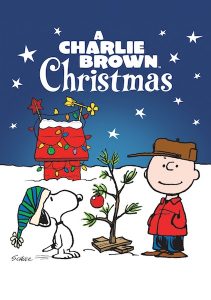
I know, everyone adds this one to their list of favorite Christmas specials, but why wouldn’t they? It’s a classic! First broadcast in 1965, “A Charlie Brown Christmas” has been a holiday favorite for decades, and will probably continue to be one for generations to come.
Charlie Brown’s quest to understand the true meaning of Christmas communicates a timeless message of how the holiday spirit can easily be lost in materialism but still overcome it in the end. Linus’ speech about the story of Christmas and the heartwarming ending scene with Charlie Brown’s tiny Christmas tree have cemented this holiday special on my list of all-time favorites. Not to mention it has a phenomenal soundtrack! I now make it a point to listen to it every December. It’s the perfect music to get into the holiday spirit!
2) “How The Grinch Stole Christmas” (1966)
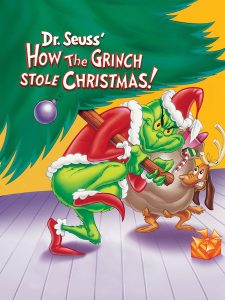
Dr. Seuss was a huge part of my childhood, so of course a classic Christmas special based on one of his books had to be on my list! Continuing on the same theme as “Charlie Brown”, “How The Grinch Stole Christmas” is another great story that criticizes the commercialization of Christmas and reminds us that the holiday season should be about so much more than presents and feasts.
For as long as I’ve been watching this special, the Grinch has always made me laugh with his antics, and I’m not ashamed to admit that I get a little choked up every time his heart grows three sizes and he embraces the true meaning of Christmas. With its fantastic story, animation, narration, and music, “How The Grinch Stole Christmas” is another holiday special for the ages!
3) “Merry Christmas, Mr. Bean” (1992)

Hey, I never said anything about listing my favorite American Christmas specials! I have so many fond memories of watching Mr. Bean with my sisters, and “Merry Christmas, Mr. Bean” was always one of our favorite episodes. From playing with a nativity scene to conducting a Christmas band to getting a turkey stuck on his head, Mr. Bean never failed to keep us laughing from beginning to end. Definitely a Christmas special worth watching!
What about you? What are some of your favorite Christmas specials?
My Reading Goals: Books I’ve Read in 2017
As we reach the end of 2017, it’s a good time to look back on our achievements over the past year. Back in January, I set another goal to read 10 books for the Goodreads Reading Challenge, and though I’m still technically working on it, I’m optimistic about reaching my goal again!
So following two January posts on the ten books I wanted to read this year and a midyear progress report in July, here’s my final report on my reading challenge goals for 2017. Enjoy!
2017 Reading Goal: 10 books
Total books read in 2017: 8 books (80%)
Books I planned to read this year and did
- The Hunger Games, by Suzanne Collins
- A Game of Thrones, by George R.R. Martin
- Fahrenheit 451, by Ray Bradbury
- 1984, by George Orwell
Books I planned to read this year but didn’t
- Wuthering Heights, by Emily Brontë
- The Martian, by Andy Weir
- Shogun, by James Clavell
- The Road, by Cormac McCarthy
- StarTalk, by Neil deGrasse Tyson
Books I read this year but didn’t plan to
- I Am Pusheen the Cat, by Claire Belton
- High Performance Paperback, by Ray Brehm and Jim Molinelli
- You Are A Writer, by Jeff Goins
- The Adventure, by Jennifer M Zeiger
Books I’m still reading
- Ready Player One, by Ernest Cline
- Creating Character Arcs, by K.M. Weiland
- The Business of Writing & Editing, by Sagan Morrow
And last but not least…
My Favorite Book of the Year: 1984, by George Orwell
What about you? Did you set any reading goals this year? Were you able to meet them? What were your favorite books of the year?
What If? Writing Prompts: Holidays IV
December is here! Another year has come and gone, and with the holiday season about to shift into high gear, it’s a great time for some more “What If?” Writing Prompts! This week’s batch of prompts once again centers around the theme of the holidays. See what holiday stories you can write from these ideas! Enjoy!
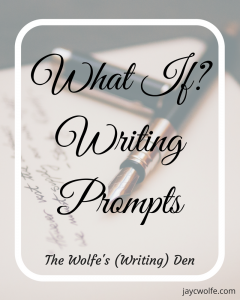 What if… instead of giving presents, Christmas centered around a tradition of doing good deeds?
What if… instead of giving presents, Christmas centered around a tradition of doing good deeds?
What if… your family only celebrated a made-up non-commercial holiday like Festivus in December?
What if… you received a mysterious Christmas present from a relative who had passed away?
What if… one Hanukkah, you and your family played a mystery game in which you’d get one new clue every night until someone won?
What if… every year, at the stroke of midnight on New Year’s Eve, you had the power to make it January 1st of any year in history, but had to live that entire year until the following New Year’s Eve?
Good luck writing more stories about the holidays!
If you have any “What If?” writing prompt suggestions (for any theme), please feel free to share them in the comments below. Ideas I like may be featured in future “What If?” posts, with full credit and a link to your blog (if you have one)! Also, if you’ve written a piece based on an idea you’ve found here, be sure to link back to the respective “What If?” post. I would love to see what you’ve done with the prompt! Thank you!
The 5-Step Post-NaNoWriMo Guide: What to Do After Winning NaNoWriMo
It’s the end of November, with only one more day left in NaNoWriMo! If you’ve finished your 50,000-word novel (or definitely will tomorrow), congratulations! There’s no better feeling than accomplishing such a huge goal!
As the month winds down, you’re probably wondering what comes next. What do you do after winning NaNoWriMo? There’s still a ways to go to get your book out there, so to help you find your footing, I’ll break it down into five simple steps. For your reference, here’s a brief post-NaNoWriMo guide to help you get from messy manuscript to published novel! Good luck!
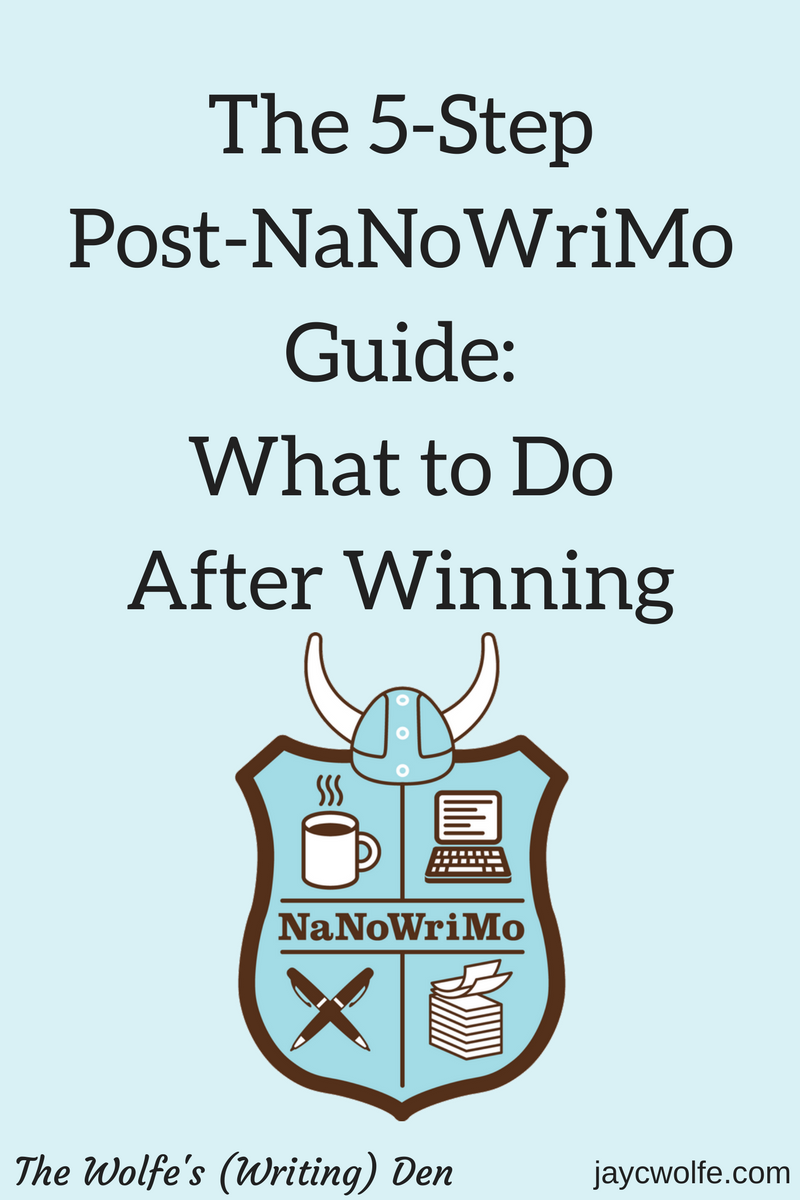
Step 1: Celebrate!
Hey, you just wrote 50,000+ words in a month! That’s nothing to sneeze at! Your novel’s journey is far from over, of course, but you don’t need to worry about publishing or marketing just yet. For now, take a bow and congratulate yourself on achieving something incredible! Go you!

Step 2: Take a break from your manuscript
After 30 days of writing nonstop, you’re probably sick of looking at your manuscript. The good news is that you don’t have to for a while! The writing part is done; now’s the time to let the first draft sit and breathe.
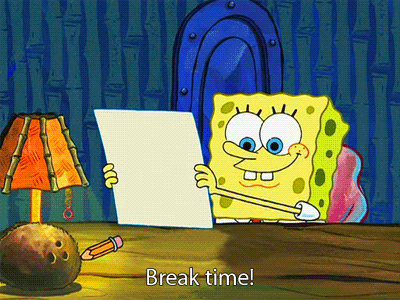
How long exactly varies from writer to writer. Two weeks to a month should be enough, but feel free to take a little more time if you need it (so long as you remember to come back to it). Go back to writing your other stories or just relax with your family over the holiday season. When the time is right to return to your manuscript, you’ll know it.
Step 3: Edit with care
November was the time to rush through your first draft just to get it done. Next comes the editing, which shouldn’t be nearly as rushed.
Once you’ve let your manuscript sit for a while, take it back up for a few thorough rounds of revisions. You don’t have to do it at sloth speed, of course, but don’t feel like you have to pants it like you did in the first round. Polish your work as much as you can until there’s nothing left you can do, then prepare to send it to a professional editor (overlapping with Step 5). Repeat this step every time you get it back until your novel is ready for publication!
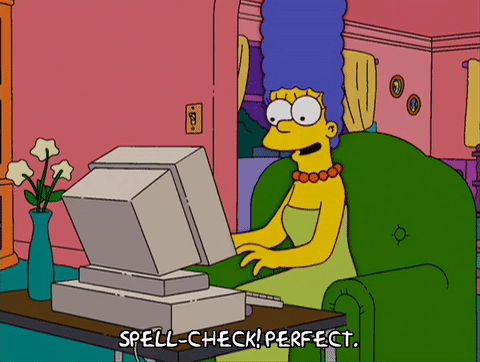
Important: Do not skip this step! However proud of it you may (and should) be, your manuscript is not ready to be self-published or submitted to a publisher at the end of November! You must edit it yourself and send it to an editor at least once before declaring your novel complete!
Step 4: Regain your confidence and keep going
The editing phase is the part where many aspiring novelists lose a large chunk of their self-confidence. Whereas writing encourages you to keep moving forward without looking back, editing forces you to confront all the mistakes you made in the first draft. Prepare yourself; it can be a real slap in the face!
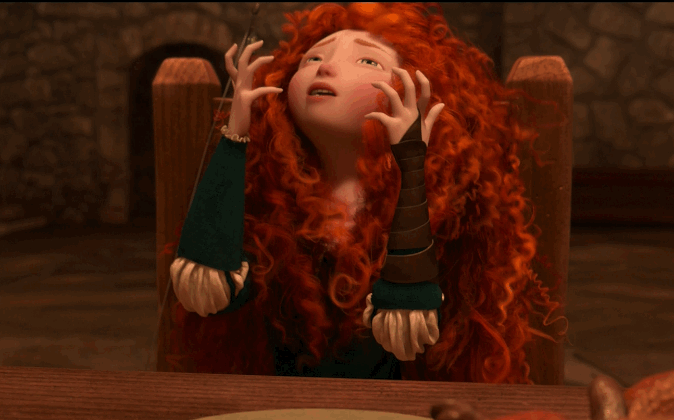
Trying to sort out everything from your plot holes and inconsistencies to your run-on sentences and misplaced commas can take a huge toll on your morale, which is why it’s important to step back and take a deep breath. Remember why you wrote this story in the first place. Know that the fear and self-doubt you feel is normal, but you can conquer it. You’ve already come this far, so buckle down and keep going until your final draft is done!
Step 5: Prepare your novel for publication!
Ok, this part actually constitutes a series of steps, but I’ll simplify it here so as not to overwhelm you. Once you’ve done as much as you can yourself, it’s time to reach out to others for help. It may sound scary, especially if you’re an introvert, but there’s no way around it. You can’t make it to the finish line alone!
Get feedback on your early drafts from beta readers: family, friends, and/or online critique groups. Hire an editor to help you polish your manuscript to a readable form (again, this part overlaps with Step 3). Reach out to book agents and publishers (if you’re going the traditional route), or find book formatters, cover designers, and book marketing outlets (if you’re self-publishing).
I know it all seems overwhelming right now, but you can do this! The key is to take it one step at a time. Keep working toward your dream and you’ll be a published author before you know it!
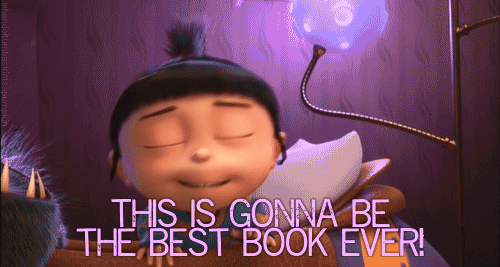
Did you win this year’s NaNoWriMo? Still working on your first draft, or are you ready to start preparing your novel for publication?
Image courtesy of National Novel Writing Month
5 Ways Reading Makes You a Better Writer
Search for tips on how to be a better writer and you’ll find this piece of advice anywhere: read. It’s no secret that reading is good for you, but no one benefits more from reading books than people who want to write their own. Reading can teach you a lot about the craft of writing, so if you really want to improve your skills, start by expanding your library. Books are among your greatest tools for writing success!
So to elaborate on the second point of my list of good writing habits, here are five ways that reading makes you a better writer. Enjoy, and best of luck in your writing career!
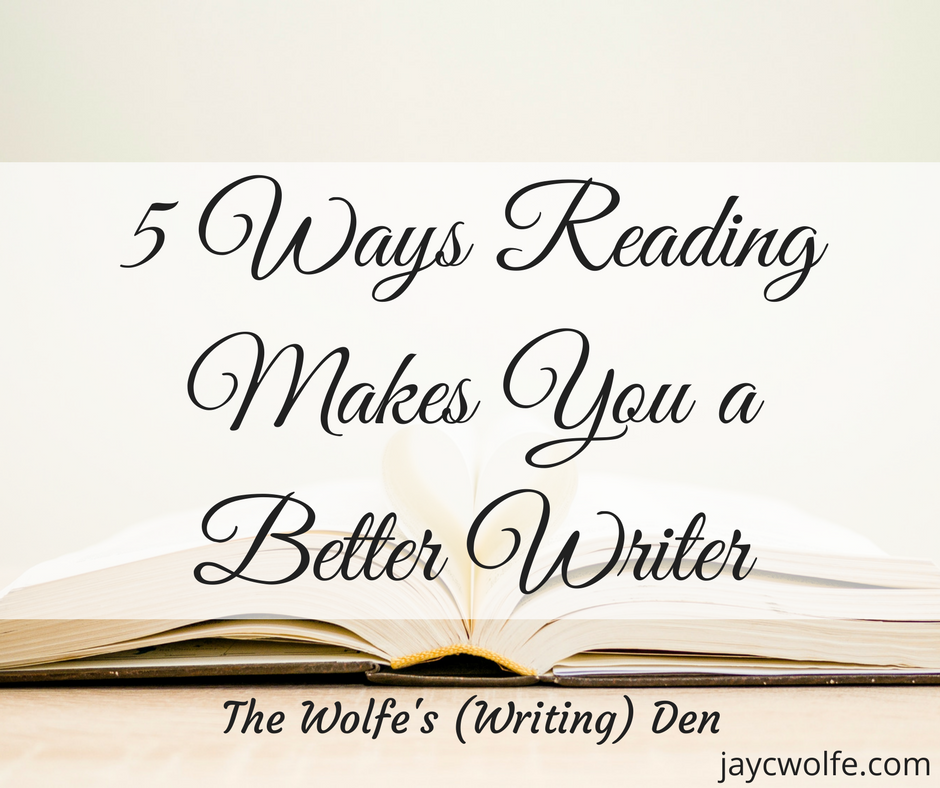
1) Reading teaches you the basics of story structure.
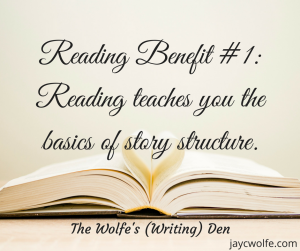 Let’s start with the obvious, shall we? If you want to learn how to write a story, the best way to start is by reading one. It’s as simple as that—so simple, in fact, that we already learned this lesson as children!
Let’s start with the obvious, shall we? If you want to learn how to write a story, the best way to start is by reading one. It’s as simple as that—so simple, in fact, that we already learned this lesson as children!
Think about the last time you read a fairy tale or watched a Disney movie. Notice that these stories always have a very basic plot structure: Hero enters, Villain causes Conflict, Hero fights Villain, Hero defeats Villain, everyone lives Happily Ever After. Doesn’t get any simpler than that, does it?
Dramatic structure refers to these steps as exposition, rising action, climax, falling action, and resolution. Of course, not all stories will follow exactly the same outline—you don’t always need a villain to create conflict, for example—but regardless of content, they will invariably have structure. Reading many books in various genres will reveal what all stories have in common, and that’s the first step toward becoming a master of fiction!
2) You learn what works in a story (and what doesn’t).
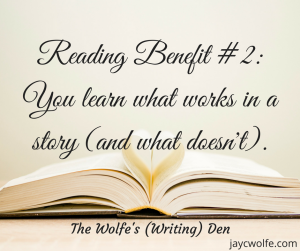 After learning the basics of story structure, the next step is to learn how to write a good story. This is easier said than done, which is why it’s important to read as many good books as possible. Only by understanding what works in other writers’ stories can you figure out how to improve yours.
After learning the basics of story structure, the next step is to learn how to write a good story. This is easier said than done, which is why it’s important to read as many good books as possible. Only by understanding what works in other writers’ stories can you figure out how to improve yours.
Now I know what you’re thinking: If art is subjective and everyone has different tastes, how can you know which books are “good”? The only way to be sure is by reading as many as you can and deciding for yourself what makes a story worth reading. An excellent piece of advice for beginning writers is to start by writing what you like, and you can’t know what you like unless you read!
Of course, bad books can be just as eye-opening as good ones. Who among us hasn’t tried to slog their way through a terribly written novel with flat characters and boring plot points? I know it sounds like torture, but the good news is that reading a bad book isn’t a complete waste of time: by recognizing the flaws that turn you off to someone else’s story, you’ll know what to avoid in yours. In short: Be the next J.K. Rowling, not the next Stephenie Meyer!
3) You get a better sense of how to write in your genre.
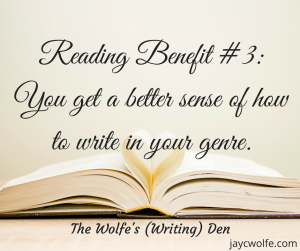 While reading is good in general, reading certain types of stories can be especially beneficial for writers. Every genre has its distinct traits, so reading in your genre of choice can teach you specific writing techniques that you couldn’t pick up from other books.
While reading is good in general, reading certain types of stories can be especially beneficial for writers. Every genre has its distinct traits, so reading in your genre of choice can teach you specific writing techniques that you couldn’t pick up from other books.
If you want to write fantasy, read series like Harry Potter or The Lord of the Rings to learn how to incorporate magic into your world in a logical and believable way. If you choose dystopian fiction, books like 1984, The Handmaid’s Tale, or The Hunger Games will help you understand how to write a future society based on a single drastically different detail. Read Stephen King‘s stories to learn how to write thrilling suspense and horror, or read Jane Austen for a sense of how to write good romantic and historical fiction.
Whatever genre you choose to write in, read those types of books until you feel confident you can write a good story that fits the style… and then keep on reading! So long as you continue indulging in books, you’ll find that you’ll never stop learning for the rest of your writing career. Your stories can only keep getting better!
4) Books expand your imagination.
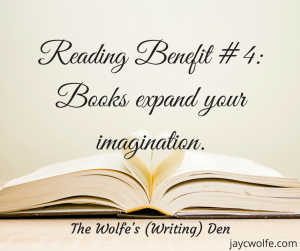 When I started reading as a little kid, it opened my entire world to hundreds of new possibilities. My love of books inspired me to start writing when I was nine years old, and I’ve never looked back. I couldn’t tell you how many of my favorite story ideas have come from reading; to this day, no matter what kind of stories I write, I can always find some ideas from books I love and influence from my favorite authors in them!
When I started reading as a little kid, it opened my entire world to hundreds of new possibilities. My love of books inspired me to start writing when I was nine years old, and I’ve never looked back. I couldn’t tell you how many of my favorite story ideas have come from reading; to this day, no matter what kind of stories I write, I can always find some ideas from books I love and influence from my favorite authors in them!
Reading books is a great way to battle writer’s block because books are a rich source of ideas. You don’t have to outright copy other writers’ ideas, of course—in fact, you shouldn’t—but emulating the concepts and styles of writers you admire will help you develop more original ideas of your own in the long run.
So whenever you’re starved for ideas, pick up a novel and see what jumps off the page. You’d be surprised how many creative new ideas are hiding in plain sight on your shelf!
5) Reading replenishes your writing energy.
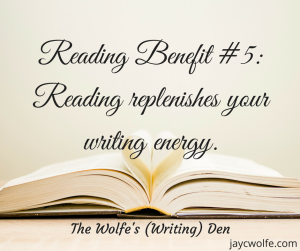 Despite all the previous points on this list, you don’t really need any other reason to read than the fact that it’s fun! Let’s face it, we all need regular breaks from our work, even when that work is our life’s passion (like writing). If you’re just not feeling the words flow, there’s no shame in stepping away from your story for a while to read someone else’s!
Despite all the previous points on this list, you don’t really need any other reason to read than the fact that it’s fun! Let’s face it, we all need regular breaks from our work, even when that work is our life’s passion (like writing). If you’re just not feeling the words flow, there’s no shame in stepping away from your story for a while to read someone else’s!
Reading has been proven to relieve stress and reduce anxiety, which is extra helpful for writers. What writer hasn’t felt stressed after hours of struggling with creative blocks or self-doubt, right? (I know I have.) Even if you are feeling relaxed and productive, fiction is a great escape from mundane routine. We’ve all had to recharge after long stretches of writing, and if you’re going to pause anyway, why not use that time to indulge in a hobby that will help you get better at it?
So the next time you feel drained of the energy to write, try picking up a book. You may find it’s just the thing you need to get you back on your writing streak!
What are your thoughts on these benefits of reading? How has reading made you a better writer?
Photo by Michał Grosicki on Unsplash
5 Good Writing Habits of Productive Writers
In many ways, fiction writing is a profession without routine. One day you’re outlining your plot and character descriptions, another you’re writing or editing scenes, still another you’re preparing your novel for publication and marketing. It’s a great career path for artists who like to be surprised by their work every day! But there is one thing that separates the truly productive writers from the dreamers and wannabes, and that’s developing good writing habits. If you really want to be a professional writer, you must build these habits; they’re the best way to keep you writing your whole life!
So for those of you who are serious about being productive writers, here are five good writing habits you should start developing today. Enjoy, and best of luck in your writing career!
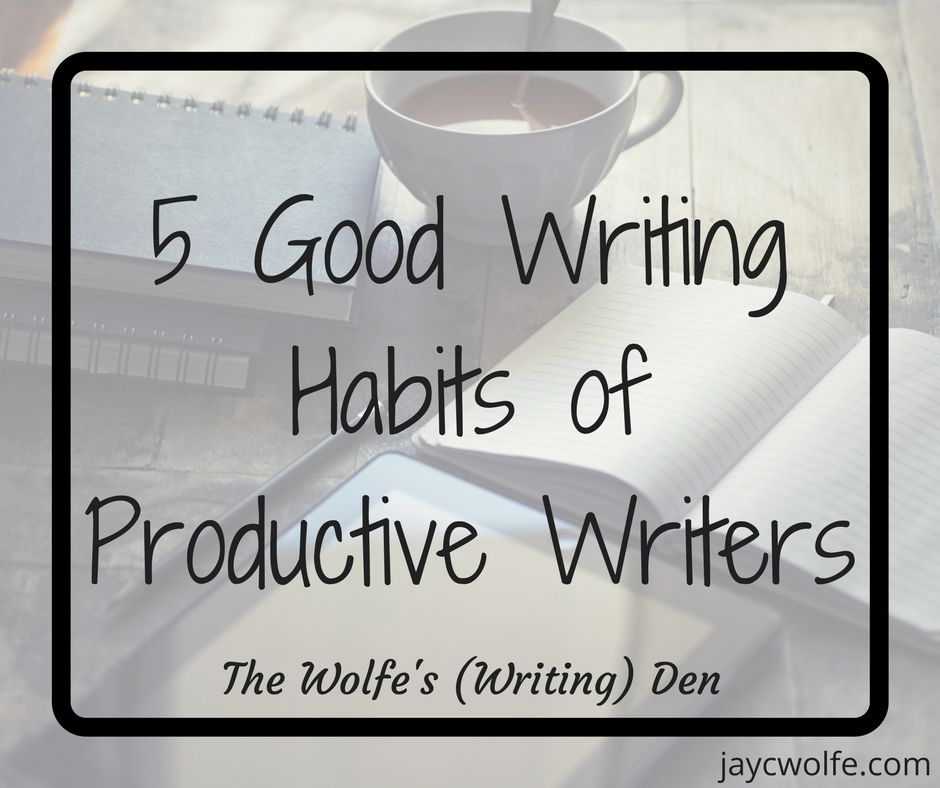
Good Writing Habit #1: Write every single day.
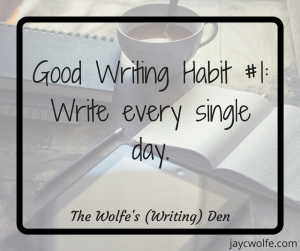 If you truly want to be a writer, you must write; otherwise you’re just a dreamer with an idea. But it’s not enough to write every once in a while; then you’re just a dreamer who sometimes writes their ideas down. If you’re serious about dedicating your life to writing, you must make writing your life. Not tomorrow, not in a week or a month or a year, today. Make every today a writing day. If that sounds harsh and repetitive, get ready because you’ll hear this advice everywhere until it sinks in: if you want to be a writer, you must write every single day.
If you truly want to be a writer, you must write; otherwise you’re just a dreamer with an idea. But it’s not enough to write every once in a while; then you’re just a dreamer who sometimes writes their ideas down. If you’re serious about dedicating your life to writing, you must make writing your life. Not tomorrow, not in a week or a month or a year, today. Make every today a writing day. If that sounds harsh and repetitive, get ready because you’ll hear this advice everywhere until it sinks in: if you want to be a writer, you must write every single day.
Of course, writing every day won’t always be easy (that’s what Habits 4 and 5 are for), but even the smallest steps of progress are better than not getting anything done at all. If you really have trouble writing when you should, try setting a writing schedule or some simple tasks to ensure you stay productive. Write down new ideas, outline your novel, work on a short story or a new scene of your book. Whatever you do, make sure you log some writing time every day until it becomes a habit. Hard as it may seem at first, you’ll soon find that it feels wrong not to write every day. Your future novelist self will thank you!
Good Writing Habit #2: Read as often as possible.
If you don’t have time to read, you don’t have the time (or the tools) to write. Simple as that. – Stephen King, On Writing
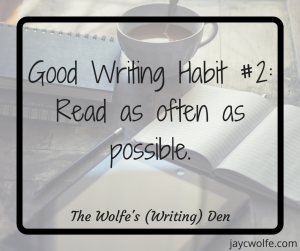 This may sound like a given, but you’d be amazed how many aspiring writers “don’t have time to read.” A thorough search through guest posts on writing blogs will reveal that virtually every editor, at one time or another, has rolled their eyes at a wannabe novelist who didn’t have a good answer to the question, “So what are you reading?” If you never want to be caught off guard by this question, always make time to read!
This may sound like a given, but you’d be amazed how many aspiring writers “don’t have time to read.” A thorough search through guest posts on writing blogs will reveal that virtually every editor, at one time or another, has rolled their eyes at a wannabe novelist who didn’t have a good answer to the question, “So what are you reading?” If you never want to be caught off guard by this question, always make time to read!
The point of reading often is to get a better feel for the craft of writing. The more books you read, the more you’ll understand what makes a good story (or a bad one). Not sure where to start? Try picking up a few popular novels in your favorite genre; these will teach you what goes into writing that type of story, or at least give you an idea if it’s the right genre for you. Don’t have a favorite? Try some popular books in a variety of genres until you find one you love! As long as you keep reading, you’ll have the tools and inspiration you need to write!
Good Writing Habit #3: Write now, edit later.
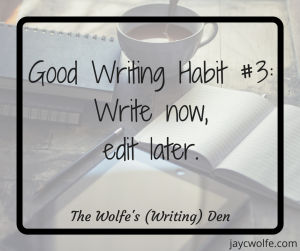 One of the most common mistakes that beginning writers make is to edit while writing. It’s a tough habit to break! I know this because I still do it myself, despite knowing better. Sometimes I’ll even go as far as to not continue a sentence until I’m sure I can get exactly the right wording onto the page the first time. But as I’ve found time and again, that’s not how writing works.
One of the most common mistakes that beginning writers make is to edit while writing. It’s a tough habit to break! I know this because I still do it myself, despite knowing better. Sometimes I’ll even go as far as to not continue a sentence until I’m sure I can get exactly the right wording onto the page the first time. But as I’ve found time and again, that’s not how writing works.
First drafts will always be messy. There’s no way around that. A story is never going to be perfect right out of the gate, and that’s okay. The point of a first draft is just to get the idea out of your head; perfecting it comes later, during the editing phase. The sooner you accept this, the more productive you’ll become in your writing. So don’t worry about getting it right the first time; just keep writing and don’t look back until your first draft is done. Always remember: Done is better than perfect!
Good Writing Habit #4: Set a daily writing goal (and stick to it).
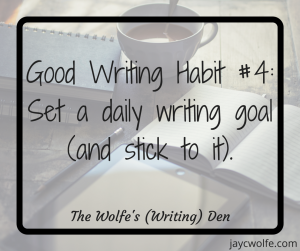 As a writer, there will be days when you simply can’t muster up the energy or motivation to write. That’s where daily writing goals come in. When you know you should write but can’t be sure how much will count as “productive”, it helps to set a daily word count goal. That way, you can write a “bare minimum” on those low-energy days and still feel like you made progress!
As a writer, there will be days when you simply can’t muster up the energy or motivation to write. That’s where daily writing goals come in. When you know you should write but can’t be sure how much will count as “productive”, it helps to set a daily word count goal. That way, you can write a “bare minimum” on those low-energy days and still feel like you made progress!
Stephen King recommends starting at 1000 words a day, but it’s up to you to figure out what goal works best for you. If you’re way too busy to hit 1000 every day, feel free to lower the bar to a more achievable goal. Got plenty of free time on your hands? Push yourself to write 1500 or 2000 words a day! Not one for word counts? Set a daily goal instead to finish a chapter or edit one more scene. The key is to find the sweet spot of a goal low enough for you to reach every day but still high enough to bring you substantially closer to a finished work of art. Whatever goal you choose, always stay productive!
Good Writing Habit #5: Protect your writing time and space.
Be ruthless about protecting writing days, i.e., do not cave in to endless requests to have “essential” and “long overdue” meetings on those days. – J.K. Rowling
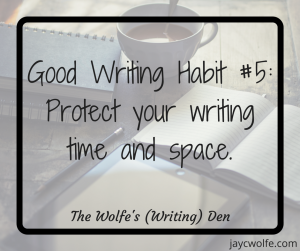 Writing is one of the loneliest professions in the world, but most writers like it that way. The problem is when we don’t have enough time or space to dedicate to our work. That’s why I can’t stress enough the importance of having a designated writing area and schedule. It’s just as important as setting a daily goal; you can’t hope to consistently meet your quota unless you can always get into the right mindset, and one of the best ways to do this is by retreating into a corner where your imagination can flow freely without distractions. If you build the habit of visiting this space at the same time every day, writing will become a lot easier in the long run!
Writing is one of the loneliest professions in the world, but most writers like it that way. The problem is when we don’t have enough time or space to dedicate to our work. That’s why I can’t stress enough the importance of having a designated writing area and schedule. It’s just as important as setting a daily goal; you can’t hope to consistently meet your quota unless you can always get into the right mindset, and one of the best ways to do this is by retreating into a corner where your imagination can flow freely without distractions. If you build the habit of visiting this space at the same time every day, writing will become a lot easier in the long run!
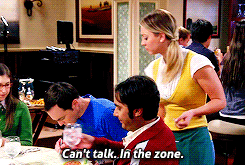 After setting your writing time and space, the next step is to guard them from the rest of your world. Writing time is sacred, and therefore should be treated as such. Close the door and work for at least an hour on a computer with no Internet connection, or for real distraction-free writing, try writing longhand on paper first and editing later as you transcribe your work to a computer. Also make sure to tell your loved ones not to disturb you during your writing time. My boyfriend understands this better than anyone I know: I love him to pieces, but he knows I’ll get crabby if he so much as tries to hug me while I’m “in the zone.” Such is the reality of a writer! Protect your writing time and space and the rest of your world will be better for it!
After setting your writing time and space, the next step is to guard them from the rest of your world. Writing time is sacred, and therefore should be treated as such. Close the door and work for at least an hour on a computer with no Internet connection, or for real distraction-free writing, try writing longhand on paper first and editing later as you transcribe your work to a computer. Also make sure to tell your loved ones not to disturb you during your writing time. My boyfriend understands this better than anyone I know: I love him to pieces, but he knows I’ll get crabby if he so much as tries to hug me while I’m “in the zone.” Such is the reality of a writer! Protect your writing time and space and the rest of your world will be better for it!
Do you practice these good writing habits? What other habits would you add to this list?
10 Signs You Are a Real Writer
So you’ve made it through the first week of NaNoWriMo! How’s that novel coming along? Whether you’re a veteran or this is your first NaNoWriMo ever, chances are you’re already starting to feel a little doubt creeping in. Maybe you’ve fallen behind on your goal, or maybe you’re beginning to feel the burnout from all that writing. But the moment your energy falters is when you expose yourself to the poisonous idea that maybe you’re not a real writer after all. Don’t give in to that thought!
So to keep you motivated through at least the next week of NaNoWriMo, here are ten signs that you are a real writer. Remind yourself of some (or all) of these truths every day and know that you can do this! Good luck!
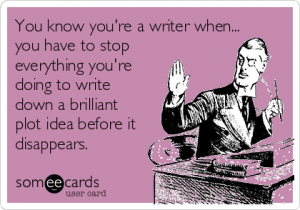 1) Telling stories is one of your best and favorite skills. – Nothing says “I’m a writer” like the gift of telling stories. If your friends and family often read your work and ask you to tell them a tale every time you hang out, you know you’re on the right track!
1) Telling stories is one of your best and favorite skills. – Nothing says “I’m a writer” like the gift of telling stories. If your friends and family often read your work and ask you to tell them a tale every time you hang out, you know you’re on the right track!
2) You’d rather spend time in your fictional worlds than your real one. – Where would you rather celebrate the holidays: the office Christmas party or the Yule Ball at Hogwarts? That’s what I thought.
3) The conversations you have with the voices in your head are way more interesting than the ones you have with real people. – Who wants to waste time on small talk when you could be discussing dragons or planning how to stop that alien invasion? The characters in your head will always have something more interesting to contribute to the conversation!
4) You carry a notebook with you everywhere you go. – Inspiration strikes when you least expect it. You gotta be ready to capture those ideas when they come to you!
5) You can find the tiniest flaws in your favorite novels. – Thinking like a writer means reading like a writer. Because you understand the craft, you can read any book and spot the smallest errors from continuity to misused words that most readers can’t. It’s kind of like having a superpower, isn’t it?
6) You never stop brainstorming story ideas. Ever. – You could be in the middle of an important business meeting, out to lunch with friends, or spending the holiday with family, but your creative mind will never shut off completely. Story ideas are everywhere! How could you possibly stop thinking about them?
7) You’re pretty sure your blood is 90% coffee. – How else are you supposed to power through those late-night writing sessions?
8) You’re a master of procrastination. – Sure, everyone procrastinates, but nobody can perfect the art quite like writers can. Writing is hard, ok? Sometimes we need a break to read or snack or play video games. Just five more minutes, I swear!
9) But once you get into that writing groove, you couldn’t stop if a meteor hit you! – Writing time is sacred. You know you’re a writer when even your family and/or significant other know not to disturb you when you’re in the zone. Bonus points if it’s because they know they’ll be punished if they do!
10) Writing is your life! – You love to write! You’ve already committed to writing a novel, haven’t you? What other proof do you need that you’re a real writer?
Have you ever doubted yourself or your writing skills? How do you handle those slips in self-confidence?

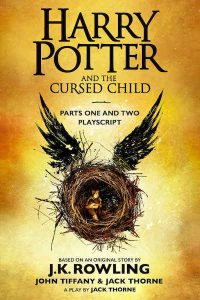
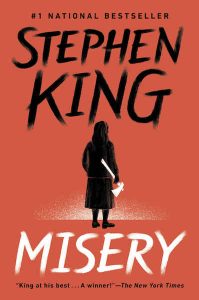
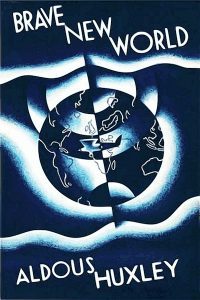
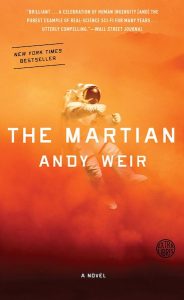



Recent Comments